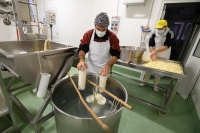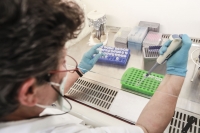News

06/03/2023
Food safety authorities interested in cell-based foods and their production processes are invited to participate in the webinar organized by the Food and Agriculture Organization of the United Nations (FAO) and the World Health Organization (WHO) on 5 April 2023.
During the session, the milestone publication titled "The safety aspect of cell-based food" will be presented, and participants will receive a link to download it. The publication includes a literature synthesis of relevant terminology issues, principles of cell-based food production processes and the global landscape of regulatory frameworks for cell-based food production. Case studies from Israel, Qatar and Singapore have been...

06/03/2023
Last week FAO began a project to improve the food control system in Kenya. A 5-million-euro project funded by the European Union, "Strengthening of Capacities and Governance in Food and Phytosanitary Control,” which was launched in November 2022, is set to provide technical support and work with Competent Authorities and other leading institutions in 12 Common Markets for Eastern and Southern Africa (COMESA) Member Countries to build capabilities, strengthen governance and improve strategic planning around two main components: food safety and plant health.
As part of the food safety component, an assessment of the national food control system will be carried...

01/03/2023
Based on the recommendations put forth at the 26th meeting of the Codex Committee on Residues of Veterinary Drugs in Foods (CCRVDF), FAO and WHO have launched a call for data for a number of veterinary drugs.
The call for data can be found at: https://www.fao.org/3/cc4430en/cc4430en.pdf
The document includes a list of veterinary drugs which will be considered at the 98th meeting of the Joint FAO/WHO Expert Meeting on Food Additives (JECFA) in February 2024.
Governments, interested organizations, producers of these compounds and individuals are all invited to submit data for the toxicological and residue evaluations, as well as for the estimation...

27/02/2023
FAO has developed a lexicon of commonly used words on the topic of antimicrobial resistance (AMR) to better align technical internal communications and materials for external audiences. The terms are now available in all six official UN languages (Arabic, Chinese, English, French, Russian and Spanish), as well as other languages.
”Having a clear and precise definitions of words, and using them carefully, is particularly important when diverse stakeholders engage in discussion so that everyone has the same understanding of the intended message,” said Jeffrey LeJeune, FAO Food Safety Officer, who led the working group to define the terms.
“Words...

24/02/2023
Narayan Paudyal from the National Animal Health Research Centre of Nepal Agricultural Research Council presented in January his recent research on antibiotic use in poultry in relation to antimicrobial resistance (AMR) of Salmonella. Paudyal introduced the first research of such kind in Nepal indicating that Salmonella and E. coli showed a high level of resistance to the most common antibiotics used to treat these pathogens. He noted that farming and

10/02/2023
Water is used for a wide range of activities in the dairy sector, which consumes a substantial volume of first-use drinking water for production processes, cleaning and disinfection. There is a great potential to exploit possible sources of reusable water in the dairy sector.
In 2020, the 43rd session of the Codex Alimentarius Commission approved the new work entitled “Development of Guidelines for the Safe Use and Reuse of Water in Food Production” proposed by the 51st session of the Codex Committee on Food Hygiene. To support this work, the Joint FAO/WHO Expert Meeting on Microbiological Risk Assessment (JEMRA) was...

07/02/2023
Campylobacter infection is among the most frequently reported foodborne diseases worldwide and commercial poultry meat is often the source. Annually, foodborne Campylobacter spp. causes more than 95 million illnesses, 21 000 deaths and nearly 2 150 000 disability-adjusted life years (DALYs).
The Joint FAO/WHO Expert Meetings on Microbiological Risk Assessment (JEMRA) is meeting this week on the pre- and post-harvest control of Campylobacter spp. in poultry meat from 6-10 February 2023 at FAO in Rome, Italy. Experts from all over the world bring their scientific knowledge to address this issue and make food safer.
Read more about the
.jpeg)
06/02/2023
A group of food safety specialists and other stakeholders involved in the food system in the Bahamas gathered last week at the National Training Agency in Nassau to validate the findings of a 12-month project and develop a strategic plan to improve the food control system in the Bahamas. The three hundred-thousand-euro project funded by FAO, "Assessing National Food Control Systems to Enable Food Safety in the Sub-region,” saw a team of FAO technical experts work with Competent Authorities (CAs) and other leading institutions in the past year to enhance capabilities, strengthen governance and improve strategic planning in the country’s...

03/02/2023
Whole Genome Sequencing (WGS) technology has been used to monitor the variants of the virus that causes COVID-19 during the pandemic and, as a result, become more widely known. In recent years, the same technology has been successfully employed by food regulatory authorities around the world, mainly in high-income countries, to investigate food safety outbreaks.
WGS is a comprehensive method for detecting and analysing the entire genome of a microorganism. In fact, this technology facilitates precise detection, investigation and control of foodborne bacterial outbreaks, leading to more rapidly and more effective decision-making in the response.
Terms such as “genome”, “sequence”, “variants”...

01/02/2023
Sprouts represent a unique food safety challenge because of the warm, moist and nutrient-rich growing environment, which is also ideal for foodborne pathogens to thrive and multiply. Therefore, it is especially important that the seeds used for sprouting are free from pathogens and to prevent the introduction of any contaminants anywhere during the sprouting-to-consumption continuum.
The Joint FAO/WHO Expert Meetings on Microbiological Risk Assessment (JEMRA) recently published a technical report on the prevention and control of microbiological hazards in sprouts. Experts reviewed publicly available literature, guidelines from competent authorities and industry associations to assess the current state of knowledge on controlling...
Stay up to date and connect to our RSS feed!
